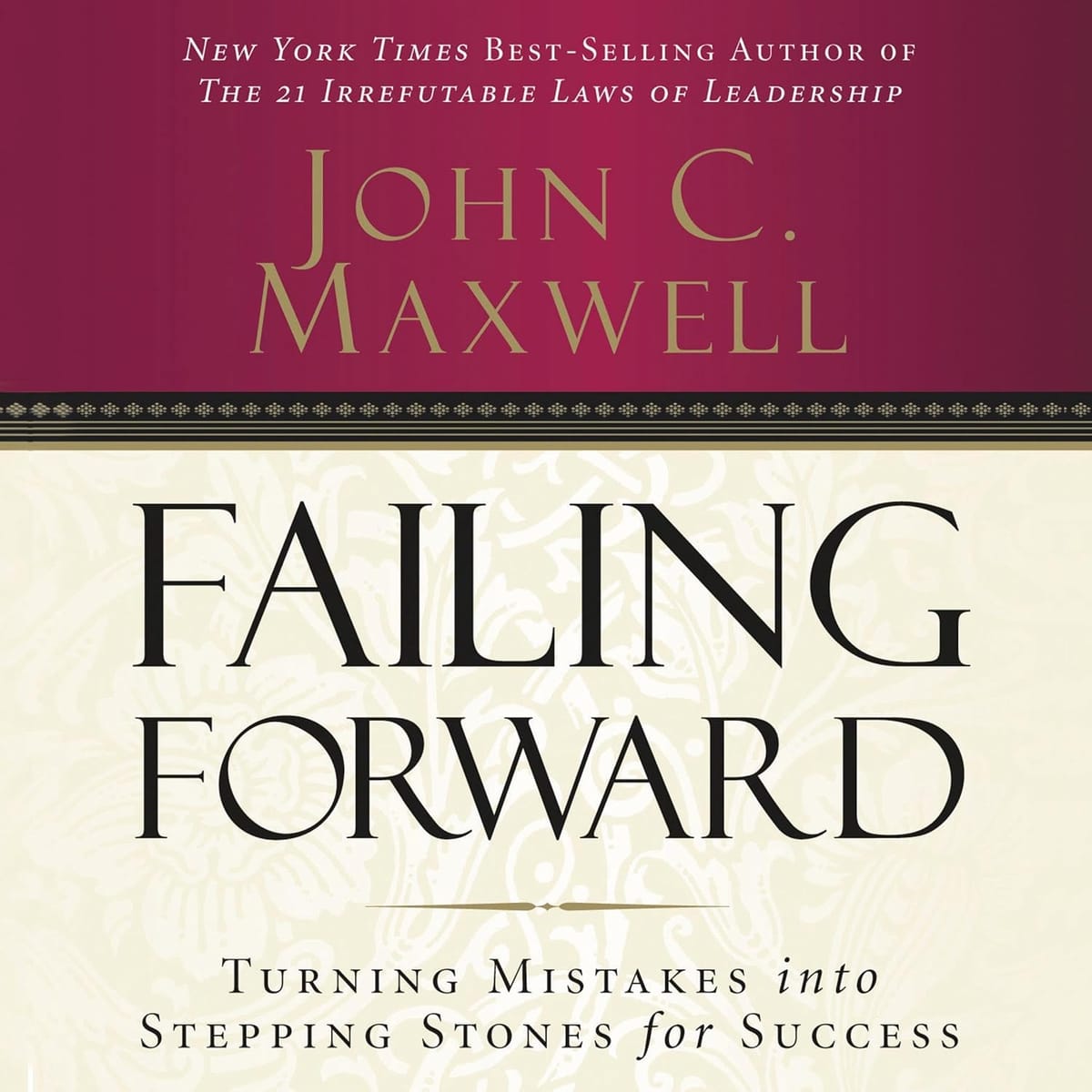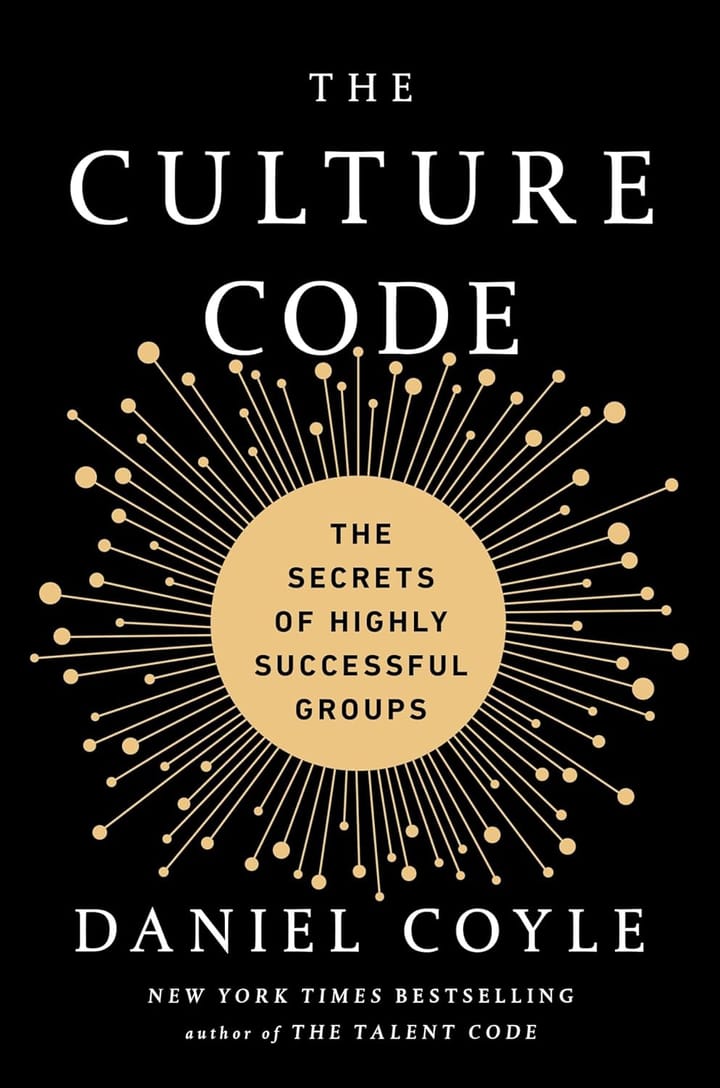Book Summary: Failing Forward
Discover the key insights from "Failing Forward" by John C. Maxwell in this comprehensive book summary article. Learn how to turn failures into success.

Essential Insights
- Failure is a necessary stepping stone to success, according to John C. Maxwell.
- Maxwell emphasizes the importance of learning from mistakes and using them as opportunities for growth.
- Readers are encouraged to adopt a positive mindset towards failure and view it as a valuable learning experience.
Introduction to Failing Forward
Have you ever thought about how failure can lead to success? Failing Forward by John C. Maxwell is a book that explores the notion that failing doesn't have to be the end of the road; it can be a stepping stone to achieving your goals. John C. Maxwell, a renowned leadership expert and bestselling author, delves into the intricacies of failing, learning, and growing in this insightful book.
For individuals looking to enhance their leadership skills and personal development, Failing Forward offers invaluable lessons and practical advice. Through real-life examples and Maxwell's profound insights, readers can gain a new perspective on failure and how it can propel them forward. This book is a must-read for anyone seeking to embrace failure as a crucial part of their journey toward success.
Summary of Failing Forward
Failing Forward by John C. Maxwell centers on the idea that failure is not the end but rather a stepping stone to success. Maxwell argues that everyone faces setbacks and challenges, but the key to growth lies in how we respond to these obstacles. The book emphasizes the importance of adopting a positive mindset about failure, viewing it as a valuable teacher rather than a definitive endpoint. By learning from mistakes, individuals can turn setbacks into opportunities for development, ultimately leading to personal and professional success.
One unique contribution of Failing Forward is Maxwell's focus on the emotional aspects of failure. He addresses the fear and stigma associated with making mistakes, encouraging readers to embrace vulnerability as part of the learning process. Unlike many traditional approaches that focus solely on strategies for avoiding failure, Maxwell provides a more holistic view by discussing the emotional resilience needed to bounce back. This emphasis on internal growth, coupled with practical advice, creates an approachable guide for readers navigating their own experiences of failure.
Several notable ideas underline the tone of the book and serve as valuable lessons. First, the concept that failure is a part of the journey of success resonates deeply throughout Maxwell's writing. He reminds us that successful individuals often encounter numerous failures before achieving their goals. Additionally, the notion that each setback provides insights that can lead to future successes encourages readers to maintain perseverance. By recognizing that failure is a natural and informative part of life, individuals can build a strong foundation for personal development and effective leadership.
Key Lessons From Failing Forward
Embracing Failure as a Learning Tool
One of the central lessons in Failing Forward is the idea that failure should not be viewed as a dead end, but rather as an opportunity for growth and learning. John C. Maxwell emphasizes that successful individuals often encounter setbacks, but it is their approach to failure that sets them apart. By treating failures as lessons, individuals can cultivate resilience and a mindset geared towards continuous improvement. Maxwell suggests keeping a journal to reflect on failures and analyze what went wrong and how to do better next time.
An example from the book illustrates this idea through a story about Thomas Edison, who famously failed thousands of times before successfully inventing the light bulb. Rather than considering those attempts as failures, Edison viewed each one as a step closer to his goal. He famously said, “I have not failed. I've just found 10,000 ways that won't work.” This attitude not only led to his ultimate success but also set an example for those who wish to innovate and create.
This lesson is significant because it encourages readers to shift their mindset regarding failure. By adopting a more positive view and actively seeking lessons from setbacks, individuals can foster a growth mindset that allows them to explore new opportunities. This shift in thinking can inspire readers to understand that failure is an integral part of the journey to success and to embrace risks that may ultimately lead to personal and professional growth.
The Role of Persistence
Another important takeaway from "Failing Forward" is the significance of persistence. Maxwell argues that the road to success is often riddled with obstacles and failures; however, it is those who persist against the odds that ultimately achieve their goals. He emphasizes that every setback can serve as a stepping stone, but only if one chooses to keep pressing forward. This concept is illustrated through stories of historical figures who faced substantial challenges but refused to give up.
Choosing a Positive Attitude
Maxwell discusses the importance of maintaining a positive attitude, especially in the face of setbacks. The mindset one adopts significantly influences how they respond to failure. A positive attitude can empower individuals to see possibilities instead of limitations and encourages a proactive approach to finding solutions. The author provides readers with practical strategies for cultivating a constructive mindset, including surrounding themselves with positive influences and practicing gratitude.
Application Ideas for Failing Forward
Embrace a Growth Mindset
One of the key ideas presented by John C. Maxwell in Failing Forward is the importance of adopting a growth mindset. This means viewing challenges and setbacks not as failures but as opportunities to learn and develop. To effectively implement this mindset, start by regularly reflecting on your experiences through journaling. Write about situations where you faced difficulties and identify the lessons learned from each. This practice helps reframe setbacks as valuable stepping stones rather than dead ends.
Additionally, cultivate the habit of seeking feedback from peers or mentors. Constructive criticism can provide essential insights that highlight areas for improvement, facilitating personal growth. By actively engaging with others and understanding their perspectives, you can identify recurring patterns in your performance and learn how to address them. This not only helps in personal development but also fosters a collaborative environment where everyone is encouraged to grow together.
To strengthen this process, set explicit goals that focus on learning rather than achievement. For example, instead of a target based solely on metrics, aim for acquiring specific skills or knowledge. Celebrate small victories on the path to your goals. Emphasizing growth can lead to a more resilient mindset that stays committed in the face of adversity. Businesses can take inspiration from companies like Google, known for encouraging experimentation and viewing failures as opportunities for innovation and learning.
Cultivate Resilience
Resilience is fundamental to Failing Forward and one practical way to cultivate this trait is by practicing self-compassion. When faced with a setback, remind yourself that everyone encounters difficulties, and it's a natural part of the journey. Acknowledge your feelings without judgment and treat yourself with the same kindness you would offer a friend. This mental shift aids in recovery and prevents perseverating on mistakes that can hinder progress.
To enhance your resilience, incorporate regular physical activity into your routine. Exercise not only supports mental health but also provides a constructive outlet for stress. Engaging in physical activities like jogging or yoga can create a clear mental separation from work-related pressures, ultimately allowing you to return with renewed focus and motivation. Furthermore, developing a support network—friends, family, or coworkers—can create a system of encouragement during challenging times.
Another actionable step is to create a personal mantra that reinforces your commitment to resilience. Phrases such as “Every setback is a setup for a comeback” can serve as powerful reminders when facing obstacles. Write it down and display it where you will see it daily, reinforcing the need for persistence. Many athletes, including Olympic competitors, utilize mantras and mental preparation strategies to push through failures, highlighting the practicality of resilience-building techniques.
Learn to Take Calculated Risks
The book emphasizes the need for taking risks to achieve growth and success. Start by identifying areas where you’ve been hesitant to act due to fear of failure. Make a list of potential risks worth pursuing, ensuring they align with your values and long-term goals. Evaluate these risks using a simple pros-and-cons analysis, allowing you to assess the potential benefits and drawbacks before making a decision. This structured approach creates a supportive way to address fears while enabling informed choices.
When implementing this strategy, adopt the “80% rule.” This principle means that when you have reached about 80% of the information needed for a decision, it’s time to take action rather than wait for perfection. This encourages you to act rather than overthink, allowing for growth through experience. A company like Amazon thrives on calculated risks; their willingness to experiment with diverse products and services reflects this concept in action, making them leaders in innovation.
To further ease the process of risk-taking, start with small experiments in your daily life. If you want to improve your communication skills, for instance, make it a point to start conversations with colleagues or share your thoughts in meetings. These minor risks can build confidence over time and gradually expand your comfort zone. By adopting this incremental approach, you can develop your ability to take larger risks, ultimately propelling you toward greater opportunities.
Implement Continuous Learning
Maxwell advocates for a commitment to continuous learning throughout one’s journey. To put this concept into practice, set aside dedicated time each week for personal development—whether through reading books, attending workshops, or engaging in online courses. This deliberate effort turns learning into a habit rather than an occasional activity, ensuring you are consistently growing your skills and knowledge.
Moreover, consider joining or creating a mastermind group where you and others can share ideas, challenges, and successes. Such groups can provide accountability and new perspectives, enhancing the learning experience. Engaging with diverse viewpoints can stimulate creativity and innovation, which are crucial components of personal and professional development.
Finally, adopt the idea of “failures as lessons” by curating a list of resources that can help you address past challenges. This could include articles, podcasts, or experiences shared by others. Reflect on them regularly to reinforce the idea that learning is a never-ending process. An example of this would be Thomas Edison, whose philosophy on failure led him to learn from thousands of unsuccessful attempts before successfully inventing the lightbulb, illustrating the enduring power of continuous learning.
Concluding Thoughts
John C. Maxwell's Failing Forward presents a refreshing approach to understanding failure as an essential part of the success journey. The book emphasizes that failure is not an endpoint but a valuable teacher, providing lessons that contribute to personal and professional growth. By adopting a positive mindset, individuals can transform setbacks into opportunities, cultivating resilience and a willingness to take risks.
Maxwell highlights the emotional aspects of failure, urging readers to confront their fears and stigma surrounding mistakes. He promotes emotional resilience and encourages embracing vulnerability as a natural part of growth. This emotional intelligence is key to understanding that successful people often encounter multiple failures before reaching their goals. With each setback comes potential insights that guide the way forward. Several vital lessons emerge from Failing Forward.
The importance of maintaining perspective when facing challenges is underscored, as how we frame our experiences significantly influences our responses. By choosing to view failure as a chance for learning, individuals can foster a healthier relationship with setbacks. Additionally, the book encourages persistence; time and again, those willing to overcome obstacles are the ones who ultimately achieve their dreams. Maxwell's focus on a positive attitude and the cultivation of a growth mindset enhances the reader's ability to navigate life's challenges. He offers practical strategies, such as journaling and seeking feedback, to help individuals reframe their perspectives on failure. By fostering a culture of continuous learning and embracing calculated risks, readers are empowered to explore their full potential.
The call to action is clear: don’t let fear hold you back. Embrace each failure as a guided step toward success and use it as an opportunity to learn and grow. Take the principles outlined in Failing Forward and implement them in your life, allowing transformation and resilience to flourish within you. Explore the valuable lessons in Maxwell's work and motivate yourself to adopt a positive attitude toward your own failures. Let these teachings inspire you to persist through challenges and to face setbacks with confidence, knowing they are but stepping stones on your journey to success.
Related Topics
- Growth Mindset: The belief that intelligence and abilities can be developed through dedication and hard work.
- Resilience: The ability to bounce back from setbacks and failures, and to keep moving forward despite obstacles.
- Leadership: The ability to inspire and guide others towards a common goal, even in the face of challenges and failures.
- Personal Development: The process of improving oneself through self-awareness, self-reflection, and continuous learning.
- Success Mindset: The mindset that views failure as an opportunity for growth and learning, and sees success as a journey rather than a destination.
Reflection & Discussion Questions
Reflection is a powerful tool for personal growth and leadership development. Whether you're exploring your own experiences or engaging in thoughtful group discussion or team training, reflection questions help uncover new insights, clarify values, and inspire meaningful action. Below are questions designed to deepen your understanding of the concepts taught in Failing Forward, and facilitate constructive conversations with your team or group.
- How can you shift your mindset regarding failure to view setbacks as valuable learning opportunities?
- What steps can you take to build emotional resilience when facing challenges and setbacks?
- How can you reframe your perspective on failure to focus on the lessons learned rather than the setback itself?
- What role does persistence play in overcoming obstacles and achieving personal and professional goals?
- How can you maintain a positive attitude in the face of failure to cultivate resilience and hope?
- What practical strategies can you implement to adopt a growth mindset and see challenges as opportunities for learning?
- How can you cultivate resilience through self-compassion and physical activity to bounce back from setbacks?
- What steps can you take to start taking calculated risks and overcome the fear of failure?
- How can you incorporate continuous learning into your personal development journey to enhance your skills and knowledge?
- What are some ways you can seek feedback from others to gain insights for personal growth and development?
- How can you celebrate small victories and maintain a positive outlook to stay committed in the face of adversity?
- How can you create a support network to provide encouragement and motivation during challenging times?
- How can you use mantras and mental preparation techniques to reinforce your commitment to resilience and persistence?
- What strategies can you utilize to start taking small experiments and risks to expand your comfort zone?
- How can you set explicit goals focused on learning and skill development to foster a growth mindset?
Recommended Reading
Below are a few recommended books related to concepts taught in Failing Forward.
- The 10X Rule by Grant Cardone. A motivational book that emphasizes the importance of setting massive goals and taking massive action to achieve success.
- Mindset: The New Psychology of Success by Carol S. Dweck. Explores the concept of mindset and how having a growth mindset can lead to greater success and resilience.
- Make Your Bed: Little Things That Can Change Your Life...And Maybe the World by Admiral William H. McRaven. Offers practical advice on how small tasks and actions can lead to a more successful and impactful life.
Frequently Asked Questions
What is the main premise of Failing Forward by John C. Maxwell?
The main premise of Failing Forward is that failure does not have to be the end of the road, but rather a stepping stone to success. John C. Maxwell argues that successful people are not those who never fail, but those who learn from their failures and use them as opportunities for growth and improvement.
How can I embrace failure and move forward in a healthy way?
Embracing failure and moving forward in a healthy way involves shifting your perspective on failure. Instead of seeing it as a negative outcome, view failure as a necessary part of the learning process. Take the time to reflect on what went wrong, what you can learn from the experience, and how you can improve in the future. By recognizing failure as a stepping stone to success, you can develop resilience and a growth mindset that will propel you forward in all areas of your life.
How can I develop a growth mindset?
To develop a growth mindset, it's important to embrace challenges, persist in the face of setbacks, see effort as the path to mastery, learn from criticism, and find lessons and inspiration in the success of others. By focusing on personal growth and self-improvement, you can learn to see failure as a stepping stone to success rather than a roadblock.
How can I turn my failures into future successes?
To turn failures into future successes, you must first embrace failure as a natural part of the success journey. Learn from your mistakes, take responsibility for them, and use them as stepping stones for growth and improvement. It's important to analyze what went wrong, make necessary adjustments, and keep moving forward with determination and resilience. Remember, every failure is an opportunity to learn and become better, so don't be afraid to fail but instead, fail forward.
Buy "Failing Forward" on Amazon
Affiliate Disclaimer
Some of the links on this website may be affiliate links. This means that, at no additional cost to you, we may earn a commission if you click through and make a purchase. Your support through these affiliate links helps sustain and improve the quality of the content we provide.



